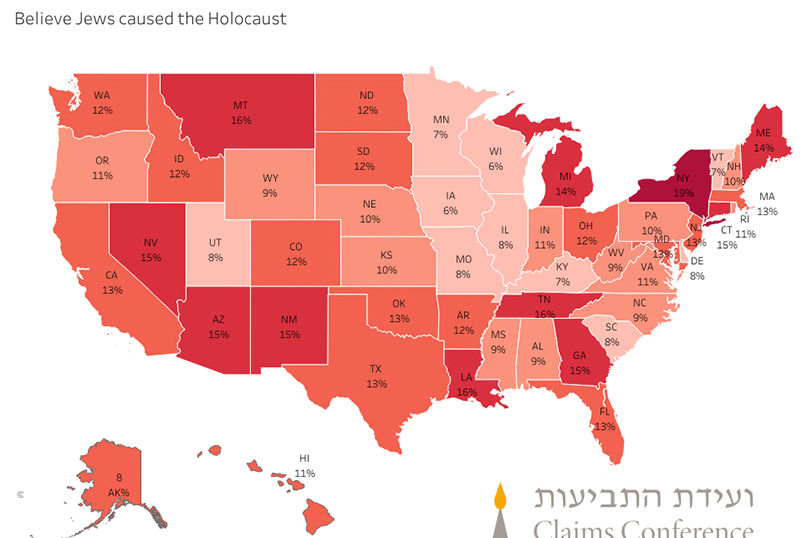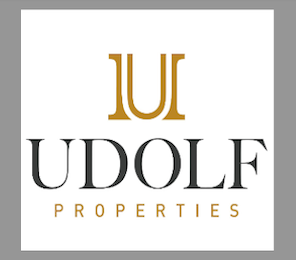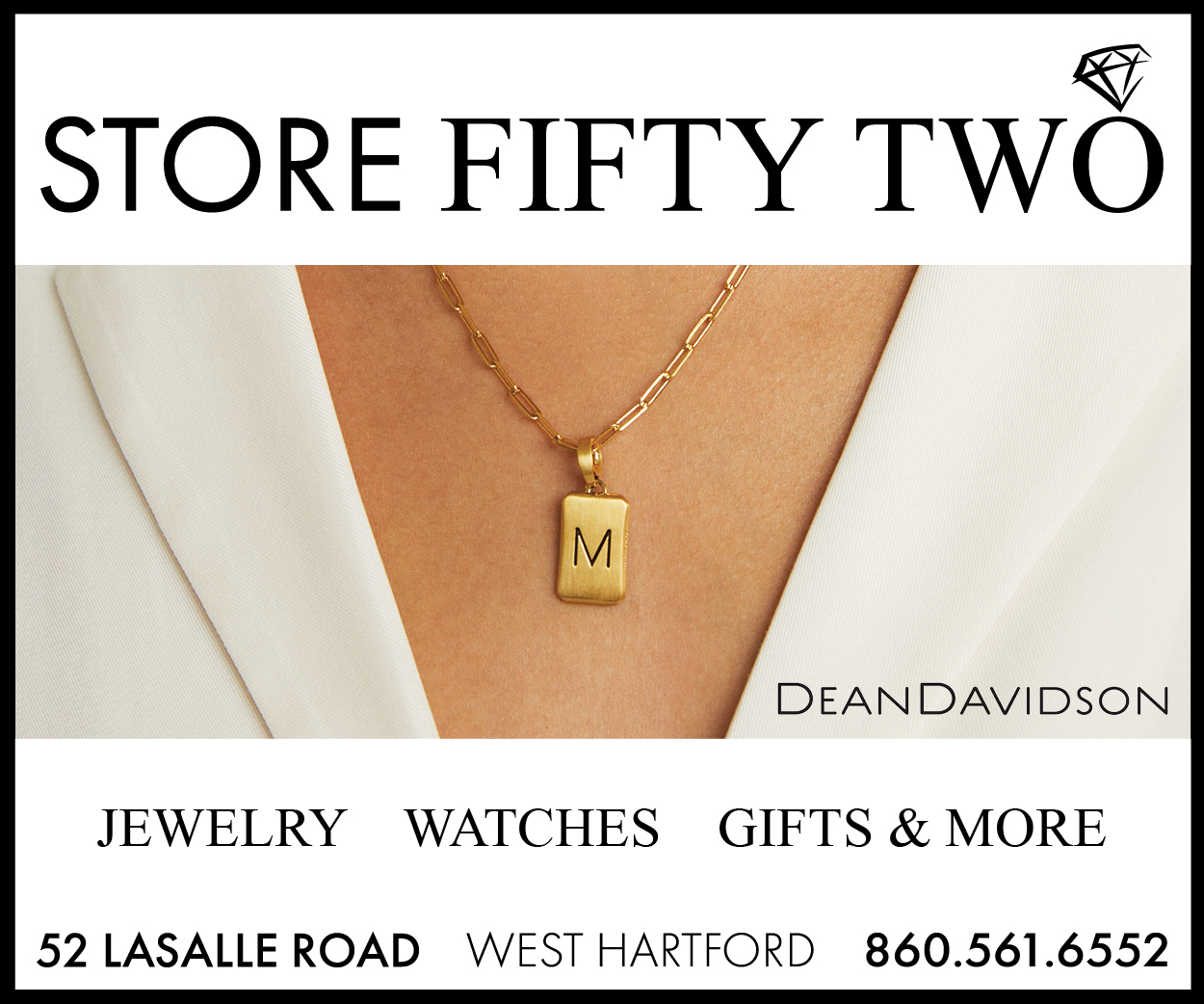
By Ben Sales
(JTA) – More than one in 10 American adults under 40 believes that Jews caused the Holocaust.
That’s one finding from a survey published Wednesday, Sept. 15, trying to gauge Holocaust knowledge among millennials and Generation Z, a cohort ranging in age from 18 to 39.
The survey found that most respondents had heard of the Holocaust and 37% knew that six million Jews died. Slightly more than half could name at least one concentration camp or ghetto.
But 11% of the respondents believed the Jews were responsible for the Holocaust, 15% said they thought the Holocaust was a myth or has been exaggerated, and 20% said people talk about it too much. Nearly half said they had seen Holocaust denial online.
The survey of 1,000 respondents across all 50 states was organized by the Claims Conference, which coordinates restitution and reparations payments for Holocaust survivors and sponsors Holocaust education programs. It was conducted in February and March.
According to the poll, there was little correlation between state Holocaust education requirements and Holocaust knowledge. None of the 10 states with the highest knowledge levels required Holocaust education in high schools, while three states in the bottom 10 – Delaware, New York and Florida – did mandate it. (Knowledge levels were based on whether respondents had heard of the Holocaust, knew six million Jews were killed and could name a concentration camp or ghetto.)
Holocaust knowledge was particularly low in New York, despite the state having the largest population of Jews in the country. Most respondents there could not name a single Nazi camp or ghetto, and 28% said they believed the Holocaust was a myth or has been exaggerated. Wisconsin had the highest knowledge score at 44%, while Arkansas had the lowest at 17%.
“Not only was their overall lack of Holocaust knowledge troubling, but combined with the number of Millennials and Gen Z who have seen Holocaust denial on social media, it is clear that we must fight this distortion of history and do all we can to ensure that the social media giants stop allowing this harmful content on their platforms,” Greg Schneider, the executive vice president of the Claims Conference, said in a statement.
It found that more than three-quarters of respondents had definitely heard of the Holocaust and another 10% said they probably had. Among those, more than 70% knew that Adolf Hitler was responsible for the genocide and 86% knew that the Jews were its primary victims. Lower numbers of respondents were aware of other facts about the Holocaust. Among those who had heard of the Holocaust, more than a third wrongly believed that two million Jews or fewer were killed, while nearly half (48%) could not name any concentration camps or ghettos. Asked to describe Auschwitz, the largest Nazi concentration camp, 64% described it correctly.
The survey also found that approximately half the respondents had seen antisemitism and Holocaust denial online. A total of 56% reported seeing Nazi symbols on social media, in their communities or both.
“The dual crisis of critical knowledge gaps, plus broad exposure to distortion and denial on the social-media apps that young Americans frequent, was the most alarming finding of the survey,” Arielle Confino, senior vice president at Schoen Cooperman Research, the firm commissioned to conduct the first-ever nationwide survey on Holocaust knowledge and awareness among millennials and Generation Z in each of the 50 states. “Social-media platforms and apps like Facebook and TikTok are undoubtedly serving as platforms for this and are clearly having an impact.”
Survey results are based on 1,000 interviews nationwide with adults ages 18 to 39 between Feb. 26 and March 28, 2020. The margin of error for the national sample is 3 percent.
Nearly 60% said they believed something like the Holocaust could happen today.
“The indicators are of concern, and that relates to ongoing concerns we have that education is in decline and social media use of hate and antisemitism is on the rise,” said Gretchen Skidmore, director of education initiatives at the U.S. Holocaust Memorial Museum in Washington, D.C., and a member of the task force that oversaw the survey.”
Respondents agreed that Holocaust education is important, with 64% believing it should be compulsory in school. Currently, 15 states require Holocaust education in high school, according to the Holocaust museum. A bill providing $10 million to the museum to enhance Holocaust education was signed into law this year.
Still, 50% agreed that the lessons about the Holocaust are “mostly historically accurate, but could be better. … There are some conditions that need to be present for Holocaust education to be successful,” Skidmore said, adding that the survey showed there was “fundamental knowledge missing.”
In addition to mandating Holocaust education, states must ensure that teachers have proper training to teach the subject matter.
“The survey is the beginning of a conversation we must all have, not the end,” Matthew Bronfman, who chaired the Claims Conference task force behind the survey, told the Jewish News Service (JNS). “It raises many questions and highlights many areas where scholarly and empirical research is required. Having said that, we are now eight decades past the Holocaust. The world has made a promise to Holocaust survivors to ‘never forget,’ but perhaps inevitably, the world has moved on.”
He added, “The lessons of the Holocaust have eternal value–not only for the victims and their families, not only for the Jewish community, but for humanity.”
Main Photo: A chart showing the percentage of respondents who believe that “Jews caused the Holocaust.” Credit: The Conference on Jewish Material Claims Against Germany.








 Southern New England Jewish Ledger
Southern New England Jewish Ledger









